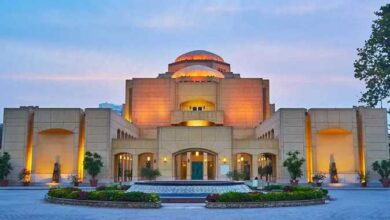Badiaa Bouhrizi, an underground Tunisian composer and singer, paid her first visit to Egypt last week and performed to an ecstatic crowd at Genaina Theater on Thursday night. Her music, known for mixing lyrics – sung in Fusha (classical or literary Arabic) – with oriental sounds and subtle electronic beats, is capturing a growing fan base.
In an interview with Al-Masry Al-Youm, Bouhrizi spoke about her background and music.
“Music of the heart, any type of art is related to the heart,” Bouhrizi immediately says when asked how she would describe her music.
She sees herself on a self-searching journey and this also applies to her music. “It might sound oriental or Tunisian, but with the guitar it comes off more like a mix; I don’t know what to call it exactly.”
“A friend studying music told me my music could be described as bel canto Afro Arab Mediterranean, which is too long of a phrase,” says Bouhrizi.
On her Facebook page, she humorously describes her work as classical Japanese music. “This is more like playing with words or a joke because it’s almost the opposite of what I actually do.”
Frequent categorization of her music as ethno or world music bothers her; she sees such rigid classifications as holding western music very high, while amassing music from other places simply under “world music”.
“This makes my music seem exotic, whereas for me, they are the exotic ones,” she explains.
The influences on her music are many. Bouhrizi grew up listening to Fairuz, Marcel Khalifa and Sheikh Imam, and her inspirations include Mohamed Mounir, Oum Kalthoum and Kamilia Gubran, as well as French, Mexican, and Canadian artists.
“I also like Eskenderella and Wust El Balad, who I believe have developed their unique music genres,” she adds.
One unique feature of her songs is that they're sung in Fusha. “This is easier to me than singing in the Tunisian dialect. My dreams are in Fusha; I think that this comes from cartoons and animation films that I watched while growing up.”
Bouhrizi started singing at the age of seven in a choir. After finishing school she went to study musicology in Paris but did not complete her studies, believing that being a musician and studying music are different things. In Tunisia, they attach the word “Miltazema” (Arabic for committed) to her name – a name given to artists committed to freedom and justice.
Asked about her growing fan base, Bouhrizi says she doesn’t believe she’s very famous, but that she finds different people, especially young people, liking her music.
“I found a video on YouTube about my song “Ila Salma” (To Salma), with a group of teenagers dancing to it, adding the oriental “Wahda w Nos” rhythm.”
Bouhrizi composed and performed "Ila Salma", written by Palestinian poet Fadwa Touqan, for Palestinian writer and poet Salma Al-Jayyousi.
She finishes our conversation by speaking about how close she feels to Egyptians, especially after the shared experience during the revolutions, even if much of the communication happened online.
“Live free because you are born free, slavery is only in the mind.”




